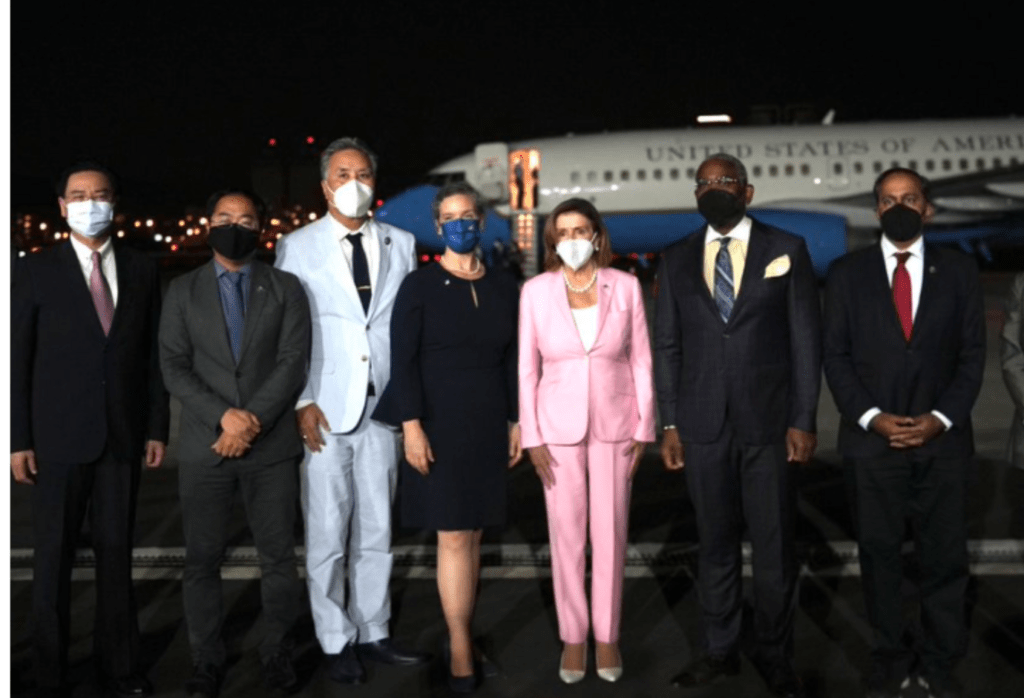Taiwan has seen its the highest-profile U.S. visit in 25 years overnight, with U.S. House of Representatives Speaker Nancy Pelosi making an unannounced arrival in the country after weeks of speculation.
The 82-year old landed in Songshan Airport in the country’s capital, Taipei, late on Tuesday night, accompanied by a delegation of six fellow American lawmakers.
On Tuesday night, Taiwan’s iconic building, Taipei 101, lit up with messages flashing: “THANK YOU” – “TW (heart) US” – “Speaker Pelosi” – “Welcome to Taiwan.”
Pelosi arrived on a U.S. Air Force transport plane from Malaysia, as part of an Asia tour that includes visits to Singapore, South Korea and Japan.
Pelosi is the most-senior U.S. political leader to visit Taiwan since 1997, when then-House speaker Republican Newt Gingrich visited.
Taiwan’s foreign minister, Joseph Wu, and the top U.S. representative in Taiwan, Sandra Oudkirk, greeted Pelosi and her delegation at their arrival.
Pelosi’s visit signals U.S commitment to the self-ruled island of almost 24 million people — but China is furious, condemning it as a threat to the recent stability in the Taiwan Strait, despite tensions elevating since Russia’s invasion of Ukraine.
China does not consider Taiwan a sovereign nation and has indicated the use of military force to bring it under its control.
Taiwan’s presidential office has announced Pelosi will meet with President Tsai Ing-wen this morning where the pair expect to have lunch together.
Shortly after landing, Pelosi made a statement, saying: “Our congressional delegation’s visit to Taiwan honours America’s unwavering commitment to supporting Taiwan’s vibrant democracy.”
“America’s solidarity with the 23 million people of Taiwan is more important today than ever, as the world faces a choice between autocracy and democracy.”
In an opinion piece published in Washington Post after landing, titled “Why I’m leading a congressional delegation to Taiwan,” Pelosi said her visit “should be seen as an unequivocal statement that America stands with Taiwan, our democratic partner, as it defends itself and its freedom”.
She praised Taiwan’s commitment to democratic government, citing the Taiwan Relations Act, which passed 43 years ago, describing it as “one of the most important pillars of US foreign policy in the Asia Pacific,” that “set out America’s commitment to a democratic Taiwan, providing the framework for an economic and diplomatic relationship that would quickly flourish into a key partnership”.
“[the Act] fostered a deep friendship rooted in shared interests and values: self-determination and self-government, democracy and freedom, human dignity and human rights”.
In her op ed, Pelosi, the second in the line of succession to the U.S. presidency, also criticised China’s role in causing rising tensions with Taiwan in the past few years.
“We cannot stand by as the CCP [Chinese Communist Party] proceeds to threaten Taiwan – and democracy itself,” Pelosi wrote.
“[China] has ramped up patrols of bombers, fighter jets and surveillance aircraft near and even over Taiwan’s air defense zone.”
“We must stand by Taiwan, which is an island of resilience.”
Pelosi added that China’s Department of Defence have indicated their army will “likely [be] preparing for a contingency to unify Taiwan with the PRC by force”.
Shortly after Pelosi’s arrival in Taipei on Tuesday night, China’s foreign ministry criticised her visit, saying it “has a severe impact on the political foundation of China-U.S. relations, and seriously infringes upon China’s sovereignty and territorial integrity.”
In recent weeks, Chinese warplanes have been seen flying close to the median line dividing the Taiwan Strait, according to sources obtained by Reuters.
Chinese state news agency Xinhua has reported live-fire drills and other exercises would be conducted by the Chinese Maritime Safety Administration around Taiwan between Thursday to Sunday, while the Chinese military has said it would direct joint air and sea drills near Taiwan beginning this week.
The defence ministry of Taiwan said its armed forces have “reinforced” the island’s alertness level, after more than twenty Chinese aircraft were seen entering its air defence identification zone on Tuesday.
White House national security spokesman John Kirby said at a White House briefing that the U.S “is not going to be intimidated” by China’s threats and “will not engage in sabre-rattling.”
“We will continue to support Taiwan, defend a free and open Indo-Pacific and seek to maintain communication with Beijing,” Kirby said.
Days before Pelosi’s visit, Kirby told reporters there was “no reason” for China to turn a visit into a “pretext to increase aggressive military activity”.
“China appears to be positioning itself to potentially take further steps in the coming days,” Kirby said. “These potential steps . . . could include military provocations, such as firing missiles in the Taiwan Strait.”
“We’re going to watch this very, very closely. We’re going to make sure that she has a safe and secure visit.”
On the same day, US secretary of state Antony Blinken advised China to act responsibly and “not to engage in any escalation,” while China’s foreign ministry spokesperson Zhao Lijian said “The Chinese People’s Liberation Army will not sit back.”
According to Reuters, sources close to Pelosi said she will meet outspoken activists against China’s human rights abuses during her visit in Taiwan.
Russia’s Foreign ministry spokesperson, Maria Zakharova, has since come out to condemn Pelosi’s visit, calling the U.S “a state provocateur.”


